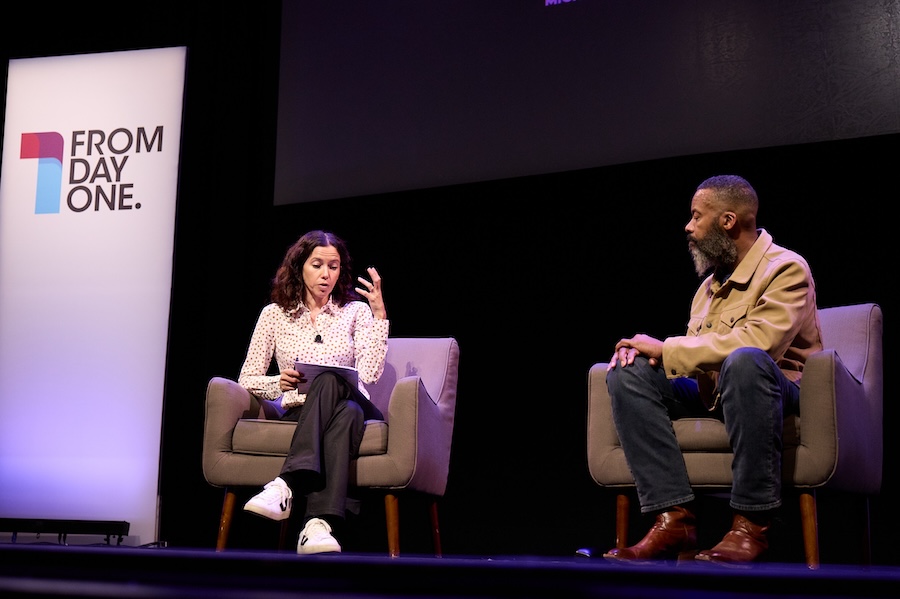How an Iconic Brand Creates Employee Resilience for the Future


Artificial intelligence. Covid. Civil unrest. Political strife. Cultural reckoning. Environmental disaster. All of these upsets can be associated with just the last five years alone. With so much anxiety and uncertainty, how can organizational leaders help their employees cope?
Since stressful disruptions seem to come along every day, Levi Strauss & Co. is taking a proactive approach to building employee resilience. That means preparing its workers for business transformations like AI, but also focusing on the many aspects of wellness: physical, mental, and financial.
During a fireside chat at From Day One’s San Francisco conference, Bernard Bedon, EVP and CHRO of the beloved 172-year-old brand discussed how the company stays true to its values of belonging and cultural intelligence, while also maintaining its sense of purpose and commitment to social impact.
How to Build a Resilient Culture
Levi Strauss & Co. uses its Seen & Heard program to help employees develop cultural competence, says Bedon. This simulcast hybrid conference broadcasts live events from its Singapore, Brussels, and San Francisco headquarters.
“For us, it’s a way to tie our entire population together around critical areas that we think are going to help the culture as well as the performance of the organization,” Bedon said. Having these international programs encourages employees to be curious about other cultures and how that knowledge can help them anticipate different dynamics and drive solutions.
These honest conversations are important to building resilience in fraught times. “These disruptions that we’re seeing, whether they’re technological, political, you name it, have really broad impact,” said moderator Michal Lev-Ram, contributing editor for Fortune and contributor at CNBC.
Bedon says HR can no longer be reactive: “Let’s not just catch people when they fall, which has been the traditional way that HR shows up.” Instead, HR needs to take an active approach to understanding how disruptors are impacting people’s lives, and build a culture to help them work through them before something occurs.

This became particularly pertinent during Covid, when the disruptions just kept coming, from the pandemic itself closing the organization’s physical stores, to the murder of George Floyd, political unrest, California wildfires, and a general lack of faith in institutions. “I said, ‘We can’t respond and catch each of those things. So how do we then help people to catch and respond and participate in how they build up their ability?’” Bedon said.
HR’s goal should be to help employees thrive, he says, building resilience through “financial well-being, physical well-being, and mental well-being…with the types of programs and culture that make sense.” That could mean normalizing seeking mental health support by actively advertising those benefits before they’re needed, or encouraging the use of long-term financial savings tools. Benefits should be approached with intention, he says, targeting the right types of options for various employee “personas,” such as early career, the sandwich generation, or those nearing retirement age.
Building Upon Belonging
Belonging is a key component of Levi’s core values, both with its customers and its staff. “We’ve applied it to how we look at our consumers, and some of our products are the direct result of getting that consumer input,” Bedon said. “The same thing happens with the programs that we have internally from a health and welfare perspective, education, manager training, and leadership. That is the way we get the best outcome and let everyone know their voice matters, and it’s going to drive us all forward.”
Organizations should not see DEI as a detriment. “It is not to divide people. Who would say, ‘I don’t want to be included’? We think everyone does, so we try to find a way to get that information to make it better for everybody,” Bedon said.
“I remember this conversation 30 years ago, this ‘diversity vs. meritocracy’ split. It was a false dichotomy, but if you buy into it, then you go down the wrong path. And so, for us, it’s: how do you follow the evolution of what’s necessary to do the right work, to get as many people involved as possible?”
It can be tricky to create a sense of belonging when the nature of work has changed. “I think part [of it] is going to be listening. Picking up on the signals: What are people divided about? What are people looking for? What’s missing?” Bedon said. HR will also need to stay abreast of how work itself and the subsequent necessary skill sets change, especially those tied to emerging technologies.
“Skill-building is a way to build resilience as well. Suppose people feel left behind by advances, left behind by technology, left behind by information. In that case, the resistance comes, and the bitterness comes, and the fear comes,” Bedon said.
When it comes to AI, Bedon finds many employees “want help getting started” and have a fear of failure. Both can be mitigated through structured development plans and mentorship opportunities that leave them feeling empowered rather than threatened. A sense of ownership, Bedon says, gives workers the confidence to try new things. “One of the big takeaways: help employees participate in the solution.”
Katie Chambers is a freelance writer and award-winning communications executive with a lifelong commitment to supporting artists and advocating for inclusion. Her work has been seen in HuffPost, Top Think, and several printed essay collections, and she has appeared on Cheddar News, iWomanTV, On New Jersey, and CBS New York.
(Photos by David Coe for From Day One)
The From Day One Newsletter is a monthly roundup of articles, features, and editorials on innovative ways for companies to forge stronger relationships with their employees, customers, and communities.